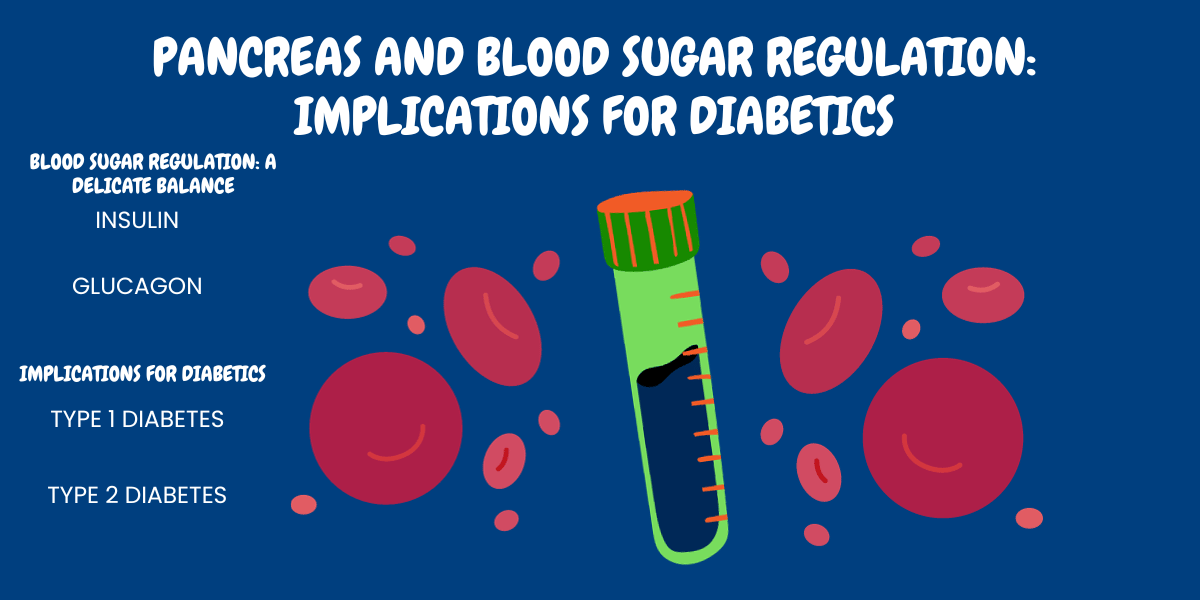Pancreas and Blood Sugar Regulation: Implications for Diabetics
Decoding the Pancreas: Blood Sugar Regulation and Diabetes Unveiled
Pancreas and Blood Sugar Regulation: Implications for Diabetics
The pancreas, a remarkable organ nestled deep in the abdomen, plays a pivotal role in regulating blood sugar levels, a function critical for overall health. For individuals living with diabetes, understanding the intricate relationship between the pancreas and blood sugar regulation is paramount. In this blog post, we will delve into the pancreas’s essential role in managing blood sugar levels and explore the implications of its dysfunction for individuals with diabetes.

The Pancreas: A Dual-Function Organ
The pancreas is a dual-function organ with exocrine and endocrine components. Its exocrine function involves producing digestive enzymes, essential for breaking down food in the intestines. Simultaneously, the pancreas houses clusters of cells called the islets of Langerhans, responsible for its endocrine function: regulating blood sugar levels.
Blood Sugar Regulation: A Delicate Balance
The body uses glucose, often known as blood sugar, as its main energy source. The pancreas tightly regulates blood sugar levels through two hormones: insulin and glucagon.
- Insulin: When blood sugar levels rise after a meal, specialized cells in the pancreas release insulin. Insulin facilitates the uptake of glucose by cells, where it is used for energy or stored for future use. This process helps lower blood sugar levels, preventing them from becoming excessively high.
- Glucagon: Conversely, when blood sugar levels drop, such as between meals or during fasting, the pancreas releases glucagon. Glucagon signals the liver to convert stored glycogen into glucose, raising blood sugar levels to maintain a stable energy supply for the body.
Implications for Diabetics
In diabetes, the delicate balance of blood sugar regulation is disrupted, leading to chronic high blood sugar levels. There are two types of diabetes:
- Type 1 Diabetes: In this autoimmune condition, the immune system attacks and destroys the insulin-producing cells in the pancreas. Individuals with Type 1 diabetes must rely on external insulin administration to regulate their blood sugar levels.
- Type 2 Diabetes: This form of diabetes occurs when the body becomes resistant to the effects of insulin, or the pancreas fails to produce enough insulin to meet the body’s needs. Poor diet and insufficient exercise are common lifestyle variables that are linked to type 2 diabetes.
Management and Implications
For individuals with diabetes, effective management involves monitoring blood sugar levels, adopting a balanced diet, regular exercise, and, in the case of Type 1 diabetes, insulin therapy. Uncontrolled high blood sugar levels can lead to severe complications, including cardiovascular diseases, kidney problems, nerve damage, and vision impairment.
Conclusion
Understanding the crucial role of the pancreas in blood sugar regulation is vital for individuals with diabetes. Through proper management, including medication, lifestyle modifications, and regular medical check-ups, individuals with diabetes can lead healthy and fulfilling lives. By raising awareness about the pancreas’s role and the implications of its dysfunction, we can empower individuals to make informed choices, promoting better overall health and well-being for everyone.




